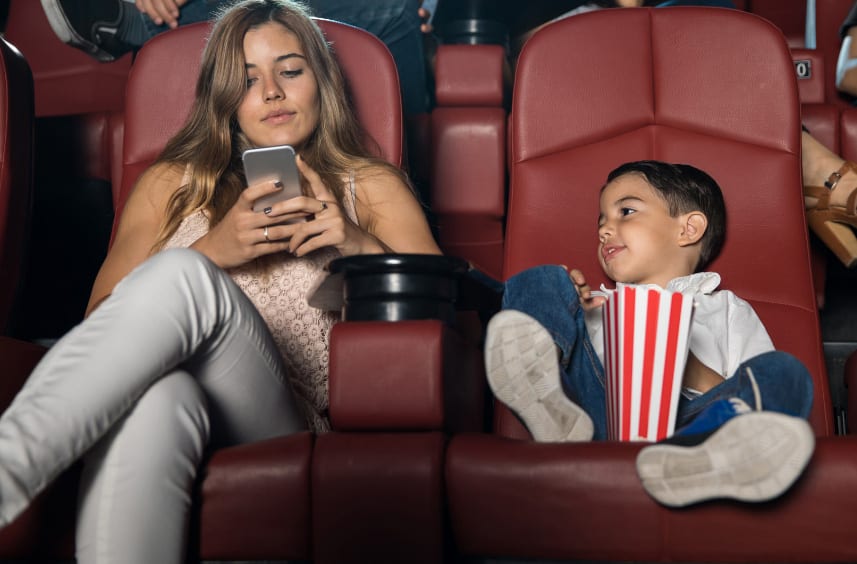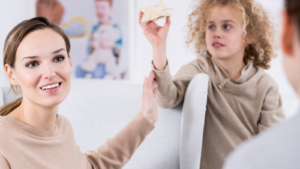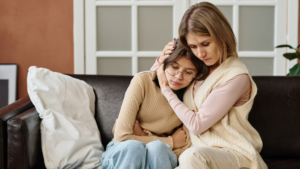Is Parent Screen Time Hurting Kids?
Yes, parent’s excessive screen time use is hurting their children because they are not just distracted but more importantly emotionally unavailable.
We know through the “still face research” that a parent’s displayed affect is critical in how a young child regulates their emotions in that moment. When a parent is distracted or disconnected, a child will try to engage their parents over and over. When a parent doesn't engage back, the child will first become distressed and then eventually become disengaged themselves.
Technology has forced its way into making a new parental-interaction style, where the parent is physically present with their child, however, they are unresponsive and emotionally not present.
What Does The Still Face Experiment Teach Us About Distracted Parenting?
The still face experiment teaches us that we are wired for connection. Since the 1970’s this research has demonstrated that even infants try to connect with their caregivers and when they don’t get it, distress and disconnection results.
A parent’s reaction or lack of reaction forms the basis of their emotional development. This social-emotional developmental window is so critical and now being negatively impacted by a generation of device distracted parents.
How is Distracted Parenting Hurting Our Kids?
When parents are distracted by their devices, they aren’t engaging with their child, which results in a child not getting those all important social interactions that are the absolute foundation for social-emotional development.
Parents are less conscious and responsive both verbally and non-verbally to their child’s needs. They miss those opportunities to give and teach emotional and communication cues.
In order to help our children learn how to behave behaviorally, emotionally, and socially, parents should limit their own screen time.
5 Tips to Help Limit A Parent’s Own Screen Time
Put Your Phone on Airplane Mode When You Are With Your Kids
This may be painful, but your phone isn’t an extension of your hand and you have to shut it off when you are with your child. We don’t have to be accessible to everyone 24 hours a day and you got one shot at doing this parenting thing right, so make sure you are fully there.
Be Present When You are With Your Kids
That means don’t take pictures every second you are with your kids because a camera lens isn’t the same as your child seeing your face and body language. You have to be there and not just physically! That means really connecting with your kid and having experiences together. Mindful parenting is something that we all strive to achieve.
Teach Your Child What Good Attention Is
If you are constantly interrupted by texts and emails when you are with your child, how will they ever know to complete a task? They are learning all about self-regulation from you and that will impact their attention and executive functioning. And when kids lack good executive functioning that means they have a hard time with everyday tasks at home and with learning at school.
Check Emails and Texts at Scheduled Times
Have an automatic message sent that says, “ I check my email at 9am, 12pm and 3 pm and will return your email within 24 hours”. Setting boundaries isn’t just healthy for you, it shows your kids how to set boundaries and hello that they are your priority when you are with them.
Teach Your Child Through Your Facial Expressions and Body Language
You have to disconnect from your device to teach your child those all important nonverbal cues. Social skills aren’t something you are born with, they are learned! Ah ha parenting moment! That is why distracted parenting is so dangerous because if your kid doesn’t learn how to regulate, that means they will have difficulty controlling their emotions and behaviors, as well as will struggle to get along with others.
Have Scheduled Technology Free Time
Look, it is hard to juggle working from home and being a parent! Putting structure and routine into your life will help you actually enjoy the time you spend with your kids. It’s even more stressful when you try to juggle those calls and texts with your kid at the park, so do your best to be engaged. Not only will it be more enjoyable but you are laying the groundwork for when your child gets older and you need to have healthy screen time boundaries for them too because we know too much technology does affect their brain and body and is linked to anxiety and depression.
Are you looking for SOLUTIONS for your struggling child or teen?
Dr. Roseann and her team are all about solutions, so you are in the right place!
There are 3 ways to work with Dr. Roseann:
- In-person at her Ridgefield, CT center
- Virtually with her home-based neurofeedback and coaching programs
- By joining her Raising Successful Kids Community
You can get her books for parents and professionals, including: It’s Gonna Be OK™: Proven Ways to Improve Your Child’s Mental Health, Teletherapy Toolkit™ and Brain Under Attack: A Resource For Parents and Caregivers of Children With PANS, PANDAS, and Autoimmune Encephalopathy.
Are you a professional who wants more training from Dr. Roseann?
Sign up for her Professional Webinars and CE-Based Courses or purchase her book, Teletherapy Toolkit™: Therapist Handbook for Treating Children and Teens.
If you are a business or organization that needs proactive guidance to support employee mental health or an organization looking for a brand representative, check out Dr. Roseann’s professional speaking page to see how we can work together.
She is the founder and director of The Global Institute of Children’s Mental Health and Dr. Roseann Capanna-Hodge. Dr. Roseann is a Board Certified Neurofeedback (BCN) Practitioner, a Board Member of the Northeast Region Biofeedback Society (NRBS), Certified Integrative Medicine Mental Health Provider (CMHIMP) and an Amen Clinic Certified Brain Health Coach. She is also a member of The International Lyme Disease and Associated Disease Society (ILADS), The American Psychological Association (APA), Anxiety and Depression Association of America (ADAA) National Association of School Psychologists (NASP), International OCD Foundation (IOCDF) International Society for Neurofeedback and Research (ISNR) and The Association of Applied Psychophysiology and Biofeedback (AAPB).
© Roseann-Capanna-Hodge, LLC 2021










